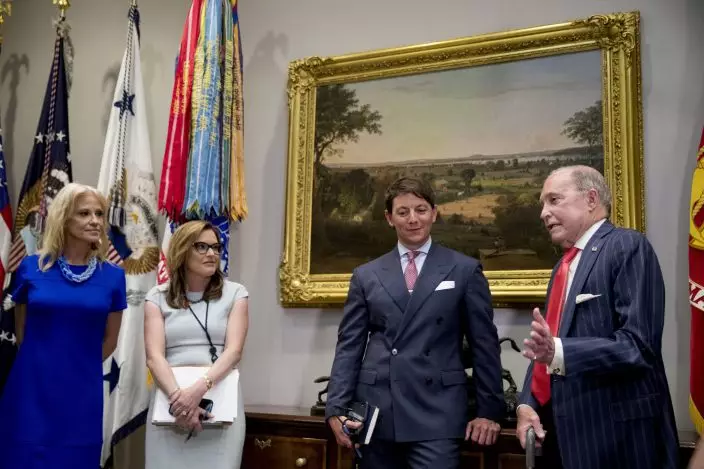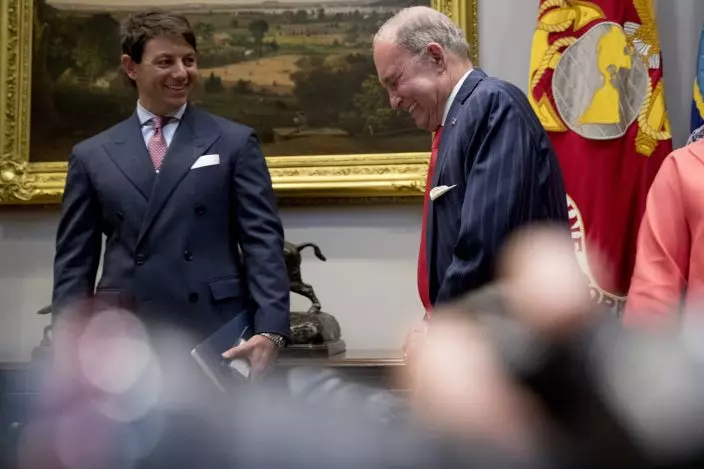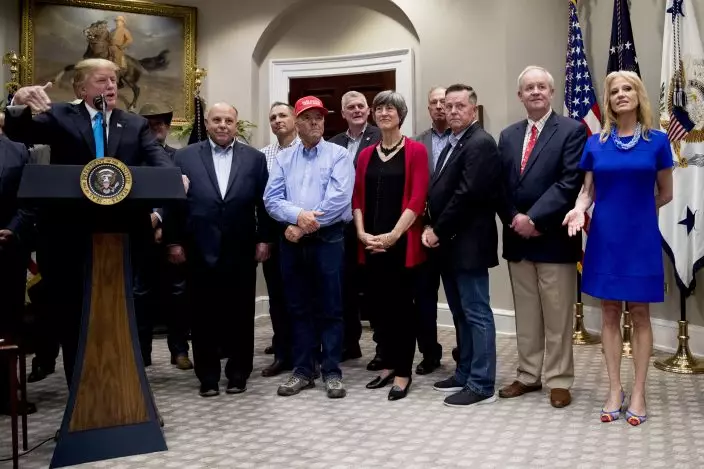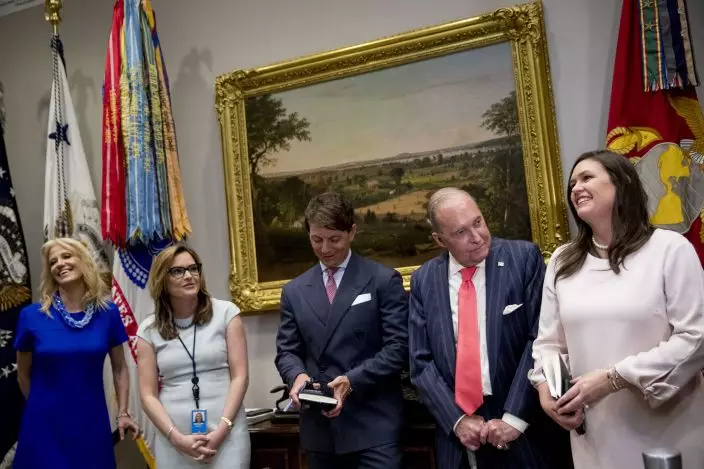Sometimes even the president of the United States needs somebody to vouch for him.
No, Trump insisted Thursday, he did not have a temper tantrum a day earlier when he cut off a White House meeting with congressional Democrats after just three minutes.
To prove it — in the middle of a meeting with farmers — he called on five members of his staff to bear witness to his demeanor.

White House chief economic adviser Larry Kudlow, right, accompanied by from left, counselor to the President Kellyanne Conway, Mercedes Schlapp, Director of strategic communications, and Deputy White House press secretary Hogan Gidley speaks after President Donald Trump asks him how his demeanor was during yesterday's infrastructure meeting with House Speaker Nancy Pelosi of Calif. and other Democratic leaders during a meeting to support America's farmers and ranchers in the Roosevelt Room of the White House, Thursday, May 23, 2019, in Washington. (AP PhotoAndrew Harnik)
One by one, his advisers dutifully stepped forward to testify, saying Trump had been "very calm," albeit "direct," in his meeting with the Democrats. Then the president questioned the mental capacity of House Speaker Nancy Pelosi, who had irked him Wednesday with her suggestion that he was engaged in a "cover-up" as he directed aides to refuse to cooperate with congressional inquiries.
The testimonials were a wild detour amid Trump's announcement of new federal assistance for farmers caught up in his escalating trade war with China.
First up was White House counselor Kellyanne Conway, his unwavering defender on cable news.

White House chief economic adviser Larry Kudlow, right, accompanied by Deputy White House press secretary Hogan Gidley, left, smiles as President Donald Trump, asks him how his demeanor was during yesterday's infrastructure meeting with House Speaker Nancy Pelosi of Calif. and other Democratic leaders during a meeting to support America's farmers and ranchers in the Roosevelt Room of the White House, Thursday, May 23, 2019, in Washington. (AP PhotoAndrew Harnik)
"Kellyanne, what was my temperament yesterday?" Trump asked. "Very calm," she said, adding that the president did not throw a temper tantrum.
Next up: White House spokeswoman Mercedes Schlapp.
"You were very calm. You were very direct," she said. "You yourself have tried time and time again to negotiate and work with them on issues like border security, which they call a manufactured crisis. It's time for them to wake up and to stop waging this political war."

President Donald Trump, left, asks counselor to the President Kellyanne Conway, right, how his demeanor was during yesterday's infrastructure meeting with House Speaker Nancy Pelosi of Calif. and other Democratic leaders during a meeting to support America's farmers and ranchers in the Roosevelt Room of the White House, Thursday, May 23, 2019, in Washington. (AP PhotoAndrew Harnik)
Trump's desire for public affirmation from those serving under him has been a defining trait of his administration. It was clear at his first Cabinet meeting nearly two years ago, when almost all his advisers offered saccharine praise for the president. World leaders have learned to shower Trump with accolades before television cameras if they want to get on his good side.
Now it was his staff's turn.
White House press secretary Sarah Sanders had stepped out of the room, so Trump turned to Larry Kudlow, the director of the National Economic Council, to weigh in.

White House press secretary Sarah Sanders, right, accompanied by from left, counselor to the President Kellyanne Conway, Mercedes Schlapp, Director of strategic communications, Deputy White House press secretary Hogan Gidley, and White House chief economic adviser Larry Kudlow, speaks after President Donald Trump asks her how his demeanor was during yesterday's infrastructure meeting with House Speaker Nancy Pelosi of Calif. and other Democratic leaders during a meeting to support America's farmers and ranchers in the Roosevelt Room of the White House, Thursday, May 23, 2019, in Washington. (AP PhotoAndrew Harnik)
"You were very calm. You laid out your case," Kudlow said.
Trump was on a roll.
"The narrative was I was screaming and ranting and raving and it was terrible," Trump said. "And I watched Nancy and she was all crazy yesterday — she was with the hands — she reminded me of Beto. She actually reminded me of Beto, maybe a little bit worse." Trump has repeatedly accused Democratic presidential candidate Beto O'Rourke of excessive gesticulation.
By then, Sanders had been summoned and returned to do her part.
"Very calm. I've seen both," she said of Trump's personality, getting a laugh from those in the room. "Very calm and straightforward and clear that we have to actually get to work and do good things for the American people."
Bringing up the rear was spokesman Hogan Gidley, who said Trump was calm but had "every right" not to be.
There was one other order of business for Trump: He gave Pelosi a nickname — "Crazy Nancy." But then he took it back, not wanting it to appear derivative of his moniker for Vermont Sen. Bernie Sanders.
He added of Pelosi: "I've been watching her a long time. She's lost it."
For her part, Pelosi suggested a staff or family "intervention" for Trump for the good of the nation.
Trump concluded with his concise verdict on his own mental state, declaring, "I'm an extremely stable genius."
UNITED NATIONS (AP) — Russia on Wednesday vetoed a U.N. resolution sponsored by the United States and Japan calling on all nations to prevent a dangerous nuclear arms race in outer space, calling it “a dirty spectacle” that cherry picks weapons of mass destruction from all other weapons that should also be banned.
The vote in the 15-member Security Council was 13 in favor, Russia opposed and China abstaining.
The resolution would have called on all countries not to develop or deploy nuclear arms or other weapons of mass destruction in space, as banned under a 1967 international treaty that included the U.S. and Russia, and to agree to the need to verify compliance.
U.S. Ambassador Linda Thomas-Greenfield said after the vote that Russian President Vladimir Putin has said Moscow has no intention of deploying nuclear weapons in space.
“Today’s veto begs the question: Why? Why, if you are following the rules, would you not support a resolution that reaffirms them? What could you possibly be hiding,” she asked. “It’s baffling. And it’s a shame.”
Russia’s U.N. Ambassador Vassily Nebenzia dismissed the resolution as “absolutely absurd and politicized,” and said it didn’t go far enough in banning all types of weapons in space.
Russia and China proposed an amendment to the U.S.-Japan draft that would call on all countries, especially those with major space capabilities, “to prevent for all time the placement of weapons in outer space, and the threat of use of force in outer spaces.”
The vote was 7 countries in favor, 7 against, and one abstention and the amendment was defeated because it failed to get the minimum 9 “yes” votes required for adoption.
The U.S. opposed the amendment, and after the vote Nebenzia addressed the U.S. ambassador saying: “We want a ban on the placement of weapons of any kind in outer space, not just WMDs (weapons of mass destruction). But you don’t want that. And let me ask you that very same question. Why?”
He said much of the U.S. and Japan’s actions become clear “if we recall that the U.S. and their allies announced some time ago plans to place weapons … in outer space.”
Nebenzia accused the U.S. of blocking a Russian-Chinese proposal since 2008 for a treaty against putting weapons in outer space.
Thomas-Greenfield accused Russia of undermining global treaties to prevent the spread of nuclear weapons, irresponsibly invoking “dangerous nuclear rhetoric,” walking away from several of its arms control obligations, and refusing to engage “in substantive discussions around arms control or risk reduction.”
She called Wednesday’s vote “a real missed opportunity to rebuild much-needed trust in existing arms control obligations.”
Thomas-Greenfield’s announcement of the resolution on March 18 followed White House confirmation in February that Russia has obtained a “troubling” anti-satellite weapon capability, although such a weapon is not operational yet.
Putin declared later that Moscow has no intention of deploying nuclear weapons in space, claiming that the country has only developed space capabilities similar to those of the U.S.
Thomas-Greenfield said before the vote that the world is just beginning to understand “the catastrophic ramifications of a nuclear explosion in space.”
It could destroy “thousands of satellites operated by countries and companies around the world — and wipe out the vital communications, scientific, meteorological, agricultural, commercial, and national security services we all depend on,” she said.
The defeated draft resolution said “the prevention of an arms race in outer space would avert a grave danger for international peace and security.” It would have urged all countries carrying out activities in exploring and using outer space to comply with international law and the U.N. Charter.
The draft would have affirmed that countries that ratified the 1967 Outer Space Treaty must comply with their obligations not to put in orbit around the Earth “any objects” with weapons of mass destruction, or install them “on celestial bodies, or station such weapons in outer space.”
The treaty, ratified by some 114 countries, including the U.S. and Russia, prohibits the deployment of “nuclear weapons or any other kinds of weapons of mass destruction” in orbit or the stationing of “weapons in outer space in any other manner.”
The draft resolution emphasized “the necessity of further measures, including political commitments and legally binding instruments, with appropriate and effective provisions for verification, to prevent an arms race in outer space in all its aspects.”
It reiterated that the U.N. Conference on Disarmament, based in Geneva, has the primary responsibility to negotiate agreements on preventing an arms race in outer space.
The 65-nation body has achieved few results and has largely devolved into a venue for countries to voice criticism of others’ weapons programs or defend their own. The draft resolution would have urged the conference “to adopt and implement a balanced and comprehensive program of work.”
At the March council meeting where the U.S.-Japan initiative was launched, U.N. Secretary-General António Guterres warned that “geopolitical tensions and mistrust have escalated the risk of nuclear warfare to its highest point in decades.”
He said the movie “Oppenheimer” about Robert Oppenheimer, who directed the U.S. project during World War II that developed the atomic bomb, “brought the harsh reality of nuclear doomsday to vivid life for millions around the world.”
“Humanity cannot survive a sequel to Oppenheimer,” the U.N. chief said.

United States Ambassador and Representative to the United Nations Linda Thomas-Greenfield addresses members of the U.N. Security Council before voting during a meeting on Non-proliferation of nuclear weapons, Wednesday, April 24, 2024 at United Nations headquarters. (AP Photo/Eduardo Munoz Alvarez)

FILE - U.S. Ambassador to United Nations Linda Thomas-Greenfield speaks on Thursday, April 18, 2024, in Tokyo. The U.N. Security Council is set to vote Wednesday, April 24, 2024, on a resolution announced by Thomas-Greenfield, calling on all nations to prevent a dangerous nuclear arms race in outer space. It is likely to be vetoed by Russia. (AP Photo/Eugene Hoshiko, Pool, File)















